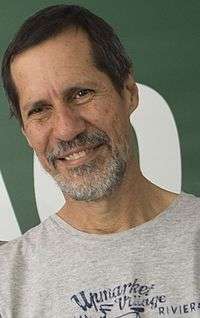Eduardo Jorge
| Eduardo Jorge | |
|---|---|
|
Eduardo Jorge in 2014 | |
| Member of the Chamber of Deputies | |
|
In office February 1, 1987 – January 31, 2003 | |
| Member of the Legislative Assembly of São Paulo | |
|
In office February 1, 1983 – December 1, 1986 | |
| Personal details | |
| Born |
Eduardo Jorge Martins Alves Sobrinho October 26, 1949 Salvador, Brazil |
| Political party |
Green Party (2003–present) Worker's Party (1980–2003) |
| Alma mater | Federal University of Paraíba |
| Profession | Physician |
Eduardo Jorge Martins Alves Sobrinho (born October 26, 1949),[1] most known simply as Eduardo Jorge, is a Brazilian public health physician and politician. He is most known for creating (or co-creating) the federal laws on family planning, voluntary sterilization, production of generic drugs, regulation of asbestos use, and linking budgetary resources for Sistema Único de Saúde.[2]
Biography
Born in Salvador, Bahia to Paraíba parents, he studied Medicine from 1967 to 1973, when he graduated at Federal University of Paraíba.[3] Following, at University of São Paulo he obtained degrees on Preventive Medicine and Public Health between 1974 and 1976.[3] Parallelly, he engaged on politics as a militant for Brazilian's Revolutionary Communist Party against the Brazilian military government.[1] In 1976, he was employed to work on São Paulo's Department of Health as director of Itaquera's Health Center.[4]
In 1980, he was one of the co-founders of Workers' Party,[1] where he was a state deputy for São Paulo between 1983 and 1987.[4] He was also São Paulo city's Secretary of Health on Luiza Erundina (1989–1990) and Marta Suplicy's (2001–2002) government.[2] Eduardo Jorge was a federal deputy from 1987 to 2003,[4] when he left the Workers' Party and joined the Green Party.[5] From 2005 to 2012, he was Secretary of the Environment of José Serra and Gilberto Kassab.[5]
In 2014, Eduardo Jorge was announced Green Party's presidential candidate in the Brazilian general election.[3] During his campaign, he advocated for the legalization of abortion, as public health issue, and for the legalization of drugs[6]—which he has already defended as a Congressman in 1995[7]—to end the war on drugs.[6] In the end, he was the sixth most voted candidate after receiving 630,099 votes, which corresponded to 0,61% of the total.[8]
References
- 1 2 3 "Eduardo Jorge foi militante contra a ditadura e fundador do PT". O Tempo (in Portuguese). July 21, 2014. Retrieved September 2, 2014.
- 1 2 "Secretaria Municipal do Verde e do Meio Ambiente" (in Portuguese). City Hall of São Paulo City. Archived from the original on July 9, 2007. Retrieved September 2, 2014.
- 1 2 3 "Eduardo Jorge é o pré-candidato do PV à presidência da República". Portal Correio. Universo Online. February 13, 2014. Retrieved September 2, 2014.
- 1 2 3 "Eduardo Jorge - PT/SP" (in Portuguese). Chamber of Deputies. Retrieved September 2, 2014.
- 1 2 Silva, Vanessa Corrêa da (May 26, 2014). "Mídia quer empurrar o PV para um gueto verde, diz Eduardo Jorge" (in Portuguese). Universo Online. Retrieved September 2, 2014.
- 1 2 Bowater, Donna (August 27, 2014). "Dilma Rousseff and Marina Silva in 'weak' Brazil TV debate stalemate". The Telegraph. Retrieved September 2, 2014.
- ↑ "Green sign for grass". Brazzil Magazine (111): 26. March 1995. Retrieved September 2, 2014.
- ↑ "Resultado da Apuração dos votos para Presidente". G1 (in Portuguese). Globo.com. Retrieved November 24, 2015. You must click on "1º Turno" tab to check the results.
